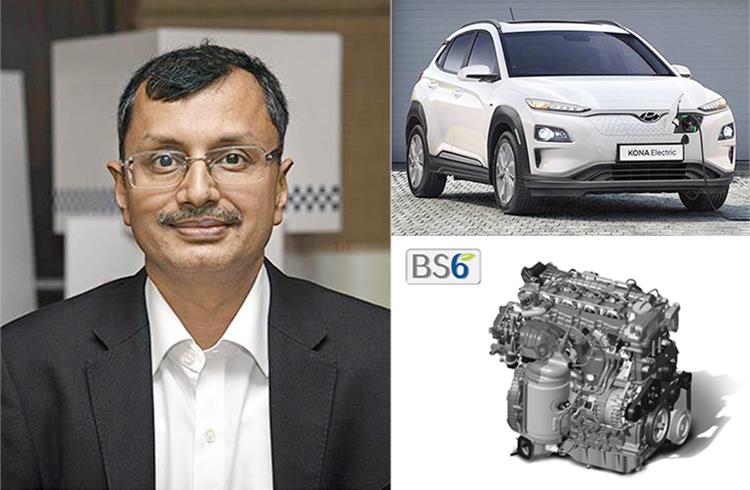Hyundai Motor India’s Tarun Garg: ‘We have to be flexible to provide relevant solutions.’
Korean carmaker’s Director (Marketing, Sales & Service) believes the market opportunity exists for all kinds of engine technologies.
With Hyundai Motor India making a conscious choice to continue with diesels in the BS VI era, the company has clearly benefited from its decision with up to 60 percent of the sales, especially for its top-selling UV Creta, being for the oil-burner powertrain.
Now even as there is a marked increase in EV adoption in India with the electric PV segment registering 110 percent year-on-year growth, the Korean carmaker believes market opportunity exists for all kinds of technologies. Mass electric mobility in India though is many years away.
According to Tarun Garg, director, Marketing, Sales and Service, Hyundai Motor India, “I think the penetration (of EVs) is still going to be very slow and it is still many years away when we can say that EVs will overpower or maybe exceed IC-engine vehicles. So, they have to really go in tandem.”
“Battery cost has really not come down at a pace it was expected to be. Once the cost of batteries comes down, EVs will be much more affordable along with the charging infrastructure also strengthening up. It is then that the entire ecosystem will be ready for a much faster adoption of EVs, but I feel it is still a long way ahead.”
“India being so big and different, all kinds of market opportunities exist and that is why I say that even when we talk about say 10 years down the line, the market will still exist for both IC engines and EVs. But yes, the march towards cleaner mobility has begun but it is not only EVs . . . it could also be hydrogen fuel cells, CNG, petrol and diesel.”
“CAFE 2 norms and RDE are coming and we will have to be very flexible and very much aware of the new technology changes happening to be able to provide relevant solutions to customers.”
Being the Indian arm of the technologically-strong Hyundai Motor Group gives it an advantage in the local scheme of things. “Having a strong parent who is very confident about the future is important. When we talk about Hyundai Motor Corporation, one can clearly see that we are really talking about new technologies. The Hyundai Nexo FC EV is already selling in good numbers in Korea and the US. We are already investing so much into the newer technologies, for instance, we have already globally launched the Ioniq brand of EVs,” says Garg.
He adds, “We are fairly confident about the future of the auto industry and are looking at revolutionary technologies. We are looking at all options such as EVs – as we have said, we will introduce a mass-market EV in the next three years. We are also looking at hydrogen fuel cells. So, we are considering various options to provide leaner, greener and cleaner mobility options for the customers.”
RELATED ARTICLES
Bosch hydrogen engine tech-powered truck to be on Indian roads this year
The global supplier of technology and services is betting big on both electromobility and hydrogen. While announcing the...
IIT Bombay inaugurates Arun Firodia Research Floor
IIT Bombay, one of India’s top technical and research institutions, honours Kinetic Group chairman Dr Arun Firodia, one ...
Maruti Suzuki expands capacity at Manesar plant by additional 100,000 units
New assembly line at Plant A expands total manufacturing capacity at the Manesar plants to 900,000 units per annum. Alon...





 25 Apr 2021
25 Apr 2021
 6695 Views
6695 Views





 Autocar Pro News Desk
Autocar Pro News Desk




